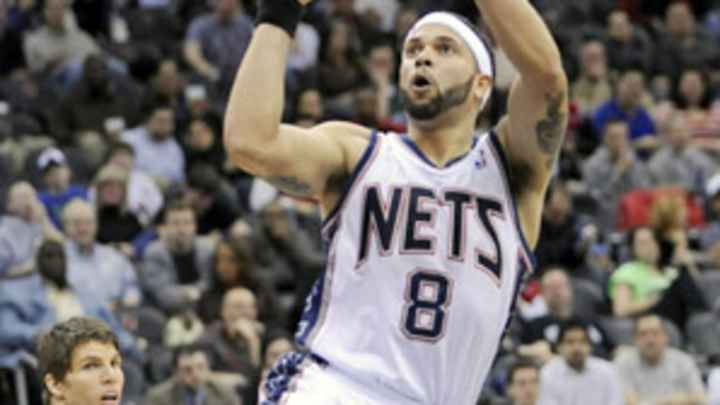Locked-out NBA players unlikely to follow Williams' lead overseas

Or even the Eurocup Pass, for that matter.
Deron Williams' Turkish adventure is likely to be an aberration.
When news spread of the New Jersey point guard's decision to play for Besiktas during the lockout, there was immediate speculation that he could be the first of many stars to take their talents overseas despite the significant risk in making such a move. But numerous agents who spoke to SI.com weren't ready to deem Williams a trendsetter, with his deal considered unique because of an opt-out clause which allows him to return to the NBA when the lockout is lifted.
"I think it's an interesting move," said agent Marc Cornstein, whose client, former Boston center Nenad Krstic, opted to sign a two-year, $9.8 million deal with CSKA Moscow in June rather than wait on an NBA free agency period that won't begin until after the lockout ends. "I'm sure it sent shock waves through the basketball world.
"[But] do I think a lot of players will follow suit? I would say no, because Deron Williams fell into a very unique position. Give the team and [Williams' agent] Jeff [Schwartz] some credit for this, but I don't know that there's another team in Europe that can combine the financial wherewithal to provide an NBA-caliber salary with the opt-out [clause] where you can get out the moment the lockout ends. I think that will be a very unique situation."
In an interview with SI.com, Besiktas coach Ergin Ataman said his team is interested in luring the Lakers' Kobe Bryant or any other star who wants to take Williams' path. Yet while reports have varied on Williams' salary (from $200,000 per month to $350,000 per month to $5 million per year), Ataman said Williams will be paid by a sponsor as opposed to the club itself.
"There's not a lot of teams who can pay NBA-caliber salaries over there," agent Mark Bartelstein said. "But you look at it on a case-by-case basis, you know, each individual team, his contract situation, what the risk vs. reward is in terms of injury. I wouldn't say (Williams' decision) will open the floodgates, but we have a lot of teams over there that we're talking to about clients of ours and if it's a deal that makes sense, then it's something we'll look at doing. And if it doesn't, then we won't."
Money isn't the only issue, though. While Besiktas is in the Eurocup, the more prestigious Euroleague teams have been showing little interest in renting an NBA player only to see him leave when the lockout is lifted. There's the matter of FIBA clearance as well, as the governing body of international basketball needs to sign off on any and all contracts.
Players who are currently under contract (albeit suspended) have a laundry list of issues to consider, chief among them the inherent risk of injury that could potentially lead to a voided deal. Some NBA observers have cited the Monta Ellis situation as evidence that a team wouldn't take that route even if its player was hurt while playing overseas in a lockout, but Cornstein contested that claim.
To review, the Golden State guard severed the deltoid ligament of his left ankle in a moped accident in the summer of 2008 and didn't return to action until late January. The accident was a clear violation of the six-year, $67 million deal he had recently signed, so the Warriors suspended him 30 games and took a lump sum of $3 million back as a result. The team retained the right to void the contract if Ellis didn't fully recover (which, for those who hadn't noticed, he clearly has).
"What did he lose, $3 million?" Cornstein asked regarding Ellis. "I wouldn't say that's insignificant. I guess the best way to answer that question [of whether it's worth it to risk a current contract] is with a question: do you want to find out? It's obviously a risk."
While players can certainly be injured while training on their own or playing in summertime pickup games, Williams' hoops reality would be far different in Turkey. According to The New York Times, Williams is expected to report to Besiktas on Sept. 1, with the season starting on Sept. 27. If and when he does play overseas, Williams would carry a target on his back that always comes with being a headliner, meaning opponents and perhaps even teammates would be eager to play a more physical brand of ball.
Nets officials can't comment on Williams because of the lockout, but it's a safe bet they were less than thrilled to hear this news. New Jersey is hoping to make him the face of its franchise next summer when he's expected to become a free agent, just in time for the team to make its long-awaited move to Brooklyn.
Yet agent Happy Walters is skeptical that Williams will ever play for Besiktas even if the lockout allows for it, and he certainly doesn't see his most high-profile client, New York forward Amar'e Stoudemire, taking that route.
"It's not even something we've talked about," Walters said. "Amar'e is not going to [do that]. It's not, I don't think, in any serious player's mindset right now in the NBA. It's about making this [labor agreement] work, getting it resolved, and getting both sides to work out the differences so we can have an NBA season. Amar'e is not looking to go overseas right now."
If nothing else, as Cornstein noted, Williams' decision is a reminder that this lockout landscape is perilous for both sides.
"Whatever side of the battle you're on, or however the collective bargaining agreement plays out, I don't think anybody can argue that the talent is the product," he said. "And if you're going to risk having that talent either pick up and leave or take on the risk of injury, that's a big risk on both sides."
